#obviously there are stories where those things are an important part of the narrative and im not saying it's automatically bad
Note
one of the reasons why TNP is one of my favorite IFs is because the cast is trans AND Hunter can be trans too and it will be acknowledged. when it was revealed in the story that Lea and Marry are trans too I was so happy!! there are barely any trans characters in IFs and VNs, even less of them are genderlocked/always trans no matter the chosen gender.
thank you! i always found it very transparent when a game only allows the mc to be nb (very few of them have actual options for binary trans people - it's too hard to do more than just code "they/them" pronouns and be vague i guess) and in my opinion that's way more immersion breaking, because that's not how the real world works. you will see trans people, every day, at like.. target or whatever. and this isn't even just about trans people but also diversity in general.
obviously when it comes to trans characters, this is an attitude that has changed a lot very fast over the past few years, so looking back at older games i don't necessarily expect there to be trans options, nor do i expect everyone to be out here writing complex "transgender" narratives, either. most people that accuse us of that are just bad faith actors. in my experience, people are just looking for basic acknowledgement; they want to see people like them existing and going on fun adventures, too. that's what i want, and that's why me, a trans author, likes to write about trans people being trans in the genre that i like - but rarely get to see myself in.
i also think when it comes to fantasy or scifi, how boring do you have to be to allow for fantastical world-building but draw the line at societal expectations? and if you want to really be specific about world-building, then why would a gender binary exist in a world where there was never a colonial power enforcing it? why do you want sexism, racism, and homophobia to exist so bad? why does it upset you so much when it doesn't?
#obviously there are stories where those things are an important part of the narrative and im not saying it's automatically bad#to write abt societal bigotry#(i have to say that or people will misinterpret me)#but i do think it says a lot when ppl insist that those things HAVE to exist#or else it's not 'accurate'#or else it's 'breaking your immersion'#like idk how to tell you this but trans people ARE real. like for real in real life#if you can't comprehend that... i think that's a you problem#and you should go read something else lmfao#also this isn't even about representation (a word i am really starting to dislike)#it's literally just... how can you not comprehend or empathize with people that may not be exactly like you?#why does it upset you so much to see other stories being told?#i should share a writing advice video i watched recently where a writer talks abt how empathy is a huge part of writing#she's right!! and it's a huge part of reading too#ask#anonymous
58 notes
·
View notes
Text
In 2020, Robert Kuciemba, a woodworker in San Francisco was infected with covid by a co-worker after his Nevada-based Victory Woodworks transferred a number of sick workers to the San Francisco site for a few months.
Through the proceedings of the case it turns out that the employer knew some employees might be sick but they transferred them anyway and ignored a San Francisco ordinance in place at the time to quarantine suspected covid cases.
Kuciemba was subsequently infected and he then infected his wife, who ended up in ICU on a ventilator.
The California Supreme Court just ruled against Kuciemba on the basis that a victory, while, in the court's words, "morally" the right thing to do, would create "dire financial consequences for employers" and cause a "dramatic expansion of liability" to stop the spread of covid.
There’s a few stunning details to note in this case. First, the court agreed that there is no doubt the company had ignored the San Francisco health ordinance. In other words, they accepted the company had broken the law. And then concluded “yeah, but, capitalism.”
Secondly, the case was so obviously important to the struggle between capitalism and mass infection that the US Chamber of Commerce, the largest business lobbying organisation got involved and helped the company with its defence. Remember, this is a tiny company in a niche industry. The involvement of the biggest business lobbyists in the country tells us a lot about the importance of the principle they knew was at stake.
Thirdly, the defence of the company is very telling. They said “There is simply no limit to how wide the net will be cast: the wife who claims her husband caught COVID-19 from the supermarket checker, the husband who claims his wife caught it while visiting an elder care home."
Well, exactly. Capitalism couldn’t survive if employers were liable for covid infections contracted in the workplace, and the ripple effect of those infections. And they know it.
This case is something of a covid smoking gun, revealing what we always suspected but had never seen confirmed in so many words: the public health imperative of controlling a pandemic virus by making employers liable for some of that control is, and always must be, secondary to capitalist profit.
This ruling is also saying out loud what has been obvious to anyone paying attention for the last two years: employers don’t have a responsibility to keep your family safe from covid. You have that responsibility. And if you give a family member covid that you caught at work and they get sick or die – even if it was a result of law-breaking by your employer – that’s on you buddy.
It is the same old capitalist story: the shunting of responsibility for ills that should be shared across society, including employers in that society, onto individuals.
This ruling essentially helps codify workplace mass infection and justifies it as necessary for the smooth functioning of capitalism.
This is not new. This is where the ‘just a cold’ and the ‘mild' narrative came from. It came from doctors and healthcare experts whose first loyalty was to capitalism. Not to public health. To money, not to lives. Abetted by media who uncritically platformed them.
While this ruling tells us little that we couldn’t already see from the public policy approach of the last two years, it is revealing (and to some extent validating) to see it confirmed by the highest law of the land in the United States.
8K notes
·
View notes
Text
It feels like there's this narrative that fandom keeps wanting to explore, with Steve Harrington, about this very specific type of martyrdom where self-sacrifice is an expression of a lack of self-worth. And, like, yes, write the narrative that's meaningful to you, and yes ok Steve does admittedly get beaten up a lot, but -- legitimately I do not think this narrative is actually Steve's story.
Like, without gendering things too much, there is something in the Steve fanon that I keep seeing that's so reflective of the specific kind of sacrifice and societal pressures exerted on girls, specifically -- this story of 'you make yourself worthy and worthwhile by carving pieces out of yourself', of believing that you must always give and never receive to justify the space you take up in the world. Yes, boys can experience this same pressure (and obviously trans and nb people of all genders run into it as well! sometimes a lot!), but especially in the mid-1980s cultural context where Stranger Things takes place, it's just...really not likely to be a dominant narrative for Steve to be operating under? It doesn't even really match the Steve we see on screen -- who is happy to make sacrifices for the sake of others, yeah, when needed, but who's not particularly kind or giving unless somebody asks first.
And Steve does get hurt a lot on other people's behalf! And this is a problem! It's just a completely different problem than the one fandom keeps writing.
Steve, and I'm going to say this forever, is a story about toxic masculinity, which the show may or may not even know it's writing. The archetypes influencing Steve's character as it shows up on the screen (and the stories and messages that Steve would actually be surrounded by in his actual life) are not deconstructions of suffering heroes who never should have had to fight in the first place and were destroyed by it. That's the Buffy the Vampire Slayer story. Steve's not Buffy. Steve's cultural context is Indiana Jones.
Steve is The Guy! And part of being The Guy is that you're expected to take the hits -- not because Steve is less important than the women-and-children he's supposed to protect, but because, the story says, he will get less hurt. Why should Steve get in between Billy and Lucas? Because Steve is an eighteen-year-old athlete and Lucas is in middle school, and of the two of them, Steve actually stands a chance. (And yes, Steve got badly hurt there, and Max had to save him -- but if Lucas, if Max had taken that beating they would not have been running through those tunnels later.) Was somebody else better-qualified to dive down to the uncertain bottom of a cold lake in the middle of the night? Steve doesn't list his credentials there as a way of justifying some ideal of martyrdom; he is literally the most likely person on the boat not to drown.
And make no mistake: when Steve's pulled into the Upside-Down, he survives the bats long enough for backup to get there. Realistic or not, he's apparently tough enough that he's physically capable of hiking barefoot through hell without much slowing down. Steve is the tank for the same reason as any tank: because he literally has been shown to have the most hit points in the group. You cannot honestly engage with Steve in this context without dealing with the fact that he's right.
AND THIS IS A PROBLEM! This is still a problem! But it's not the same problem that fandom seems to expect. It's not an expression of caretaking or the need for self-sacrifice; it's not an issue with Steve valuing himself less. It's an issue of toxic masculinity so ingrained that Steve doesn't even recognize he's suffering from it, because one of the tenets of toxic masculinity is that Big Strong Guys don't suffer. It's just a concussion, it's fine, he'll walk it off. It's not that Steve thinks he deserves to get hurt, or even that he's less deserving of safety than the others. It's that absolutely nothing in his cultural context allows him to admit that he can be hurt in a significant way.
There's still so much tension that can be gotten out of this situation, I swear. There's so much that can be explored in writing! Hell, the show itself is deconstructing some of this trope, believe it or not, by giving us a Steve who absolutely can take all the hits thrown his direction but still doesn't know what the fuck he's doing with his life. It turns out that doing his job as The Guy is only mildly helpful in horror movie situations (mostly by buying time for smarter, squishier people to do the damage from behind him), and somewhere a little worse than useless in everyday life.
But Steve does not go out of his way to self-sacrifice, he really doesn't. He just does his job. He's The Guy. Of course he's not going to let a kid or a girl or some scared skinny nerd who just learned about monsters yesterday take the hits. Of course Steve's got this.
#Stranger Things#do I dare character-tag this#does this count as an Unpopular Opinion if I'm calling out fanon#eh let's be bold#Steve Harrington#and#toxic masculinity#which is apparently just A Thing I Post About Now
2K notes
·
View notes
Text
I think a lot about the Concept of ‘choices that matter’ in video games. Like, in terms of what it is that makes a choice ‘really matter’, what do we perceive as a choice that matters or has a consequence, how do different games with different amounts of branching or non-branching storylines play with those ideas… Especially because Undertale is one of my favorite games of all time, and it has often been hyped as ‘a game where your choices REALLY matter’ and… honestly, I dunno if all of this hype was fully conducive to Undertale. Because the way it handles the concept of Video Game Choices is actually a lot more interesting and complex than that simplistic descriptor makes it seem.
Because Undertale actually has a lot of choices that ‘don’t really matter’! Lots of dialogue choices and silly little decisions that on a first playthrough seem like they’re some sort of moral choice or a branching plotline but end up always leading to basically the same result regardless of what you do!
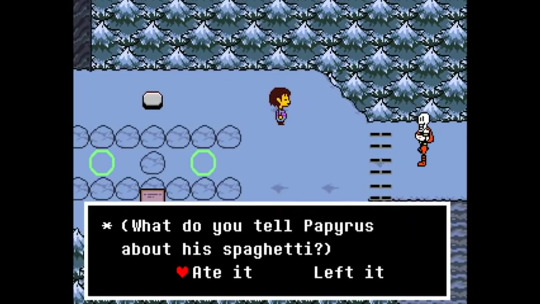
And the game doesn’t really try to hide the fact that these choices are kinda 'Fake'. I mean, on a first playthrough a player might assume there’s gonna be some Massive Consequences for picking the ‘wrong’ drink on Undyne’s date, but the game’s narrative expects for there to be multiple playthroughs and pretty much every Choice that Doesn’t Matter is peppered with that Undertale brand of wacky character-focused humor that inherently makes the moment memorable. Papyrus leading Undyne straight to you no matter what you do is basically a cross-timeline running gag.
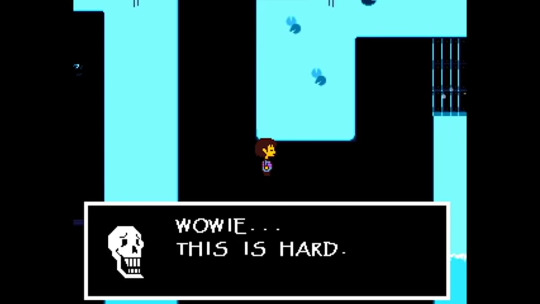
On some level I see this as a sort of gag that serves as meta-commentary about the expectations around Choices That Matter in Video Games. As in, a lot of games have their Moral Choices happen in clearly easily marked ‘this is a Moral Choice!’ moments within the story, while the actual gameplay (and any violence the player might cause as part of said gameplay) is basically entirely divorced from any element of narrative-branching and doesn't effect the story at all. Undertale basically entirely inverts this dynamic; the most important factor for which Route you’re own is how you handle your FIGHTs, and what seems like clearly-marked and obvious Moral Choices are just goofy insubstantial minor changes in dialogue.
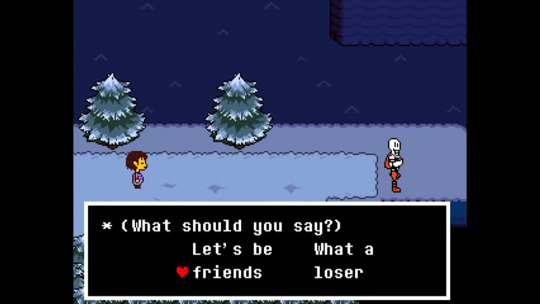
But also… there is also a level where you must ask yourself ‘what does it mean when we say that these choices Don’t Matter’. I mean, it’s not like they didn't change anything about the game, the Player still made the character say that other thing, the choice probably led to an alternate piece of dialogue, probably a joke with a call-back at the end of the game… The line between a one-off joke and an actual story-changing moment can be a little blurry if you look at it too deeply.

For example, near the end of the Waterfall part of the game, the Player is given the choice to save Monster Kid even at the risk of having to face down Undyne.

Pretty much anyone who isn’t deliberately trying to be an asshole is going to rush to save them and obviously that includes the Pacifist Route Players. But you can actually leave Monster Kid to die without it 'mattering' in the sense that it wouldn't divert you from the Pacifist Route. Undyne saves them instead of you, and ends up with slightly less HP for her battle (which might Matter for Runs when you try and FIGHT her but obviously not in Pacifist Runs) and… by the end of the game, during the extremely happy True Pacifist Ending, they still clearly remember that you abandoned them and are upset by it.

So… does saving Monster Kid ‘matter’ or not? On one hand, choosing not to save them mostly just changes a few lines of dialogue but… these lines of dialogue kinda recontextualize this happy ending and the Player’s actions in general. Despite the True Pacifist Ending otherwise portraying the Player/Frisk as a kind-hearted and brave hero... they still did this undeniably cowardly (and perhaps even cruel) act to one of their friends .
Was running away and leaving Monster Kid to die a brief but significant moment of weakness that the Player regrets and has cost them what could’ve been the start of a lovely friendship? Or is that simply that being a True Pacifist was always more of a matter of pragmatism rather than ideals? Were they only acting as a Pacifist to get that promised 'Best Ending', and only Monster Kid has an inkling they are not as heroic or kind as everyone thinks they are?
And then there’s the Snowman ‘quest’.
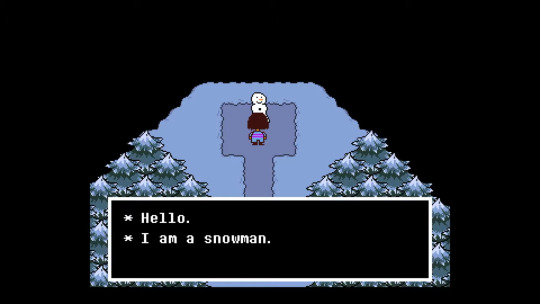
A free healing item given early in the game, with your mission being to carry it along in your inventory for as long as you can without ever consuming it. The only reward you will ever see from it is a few lines of dialogue…

But for many, it is more than enough of an incentive to preserve the Snowman’s Piece. You can do whatever you want with the Snowman without it ‘mattering’ in terms of Ending or consequences. You could carry it through all of your adventures with care and kindness... or you could eat it while he can’t see you and then go back to him and tell him that you ‘lost’ it and then get another piece and eat that as well, you could eat it right in front of his face, horrifying him.

And much like with Monster Kid, you can STILL get the True Pacifist Ending after doing that, all that would change is a few optional pieces of dialogue from the Snowman…

And a total recontextualization of the Player’s behavior and the ending. The Snowman sees the Player as a cruel and heartless person who is just pretending to be good so they can be liked - the way they acted with this immobile, powerless Snowman who could do nothing for them and their reputation reveals their true self. And he says their friends will realize that too one day...
Doing a True Reset on the Pacifist Ending is, by definition, a (almost) consequence-free action and yet it changes future Pacifist Routes immeasurably. Turning the Player into a Hypocrite doing the exact same thing they were trying to stop Flowey/Asriel from doing - trapping all of their friends into a time-loop so they can play with them forever while never actually letting them to enjoy freedom on the surface, simply because they are not willing to move on or put their friends' wishes and agency above their own. Nothing in the game actually changes, not one character can even suspect that you did something like that, and yet for the Player - this choice makes the entire Meaning of the game flip on its head.
Even the most famous and heavily-toted Big Consequence in the whole game - selling your soul to Chara after completing a Murder Route… mostly what it does is just… recontextualize the ending of the Game.
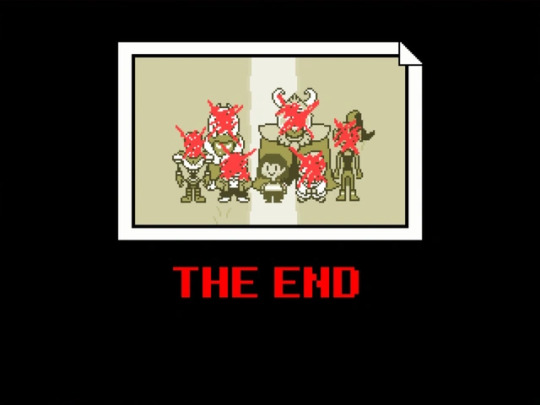
As a game, ‘Undertale’ is very much about the ways in which a Player engages with a game can radically recontextualize it. The huge chasm of difference between the Pacifist and Muder Routes is just the most literal example of it. But, in a way, even the tiny little Dialogue Options - where the lack of real choice and consequences is Obviously a Joke - matter. Because of the way they can recontextualize the Player Character’s behavior.
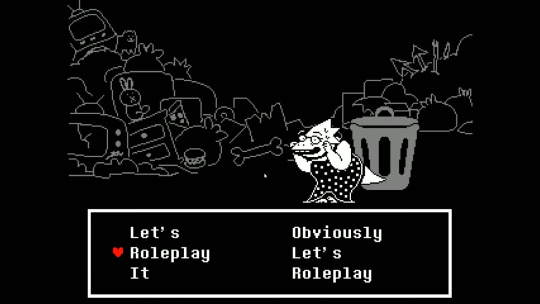
(Okay, maybe not this one, but hear me out…)
Do you trust Papyrus to not betray you, even after you spied on him with Undyne?
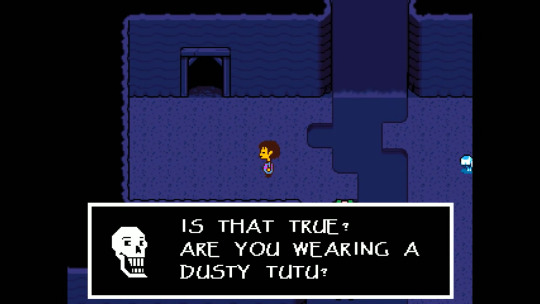
Do you have the integrity to admit you forgot something or got it wrong even when there’s no consequences for just lying about it?
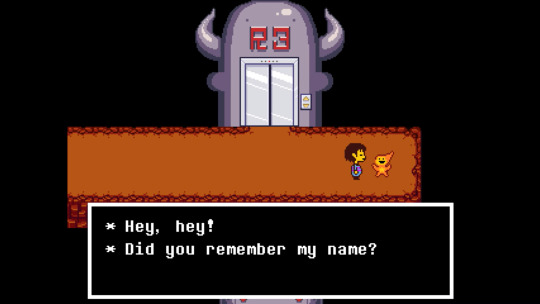
Are you a hypocrite for trying to get Alphys to be truthful with Undyne only to then immediately turn around and lie to Undyne yourself?
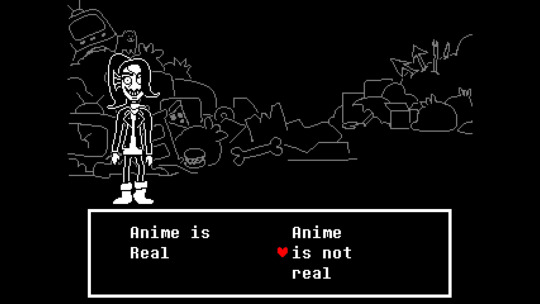
None of these choices matter for the ending, some of them don’t even get, like, a call-back joke or anything, but… if you are engaged in this story as a narrative, if you are invested in these characters as if they were people, if you are honestly trying to be the best person you can be, if you are trying to self-reflect at the way you approach this game… even the silliest little dialogue option can suddenly be imbued with deep implications and you can make them matter.
Undertale is one of the best demonstrations of this concept, but this is absolutely not exclusive to it. For example….
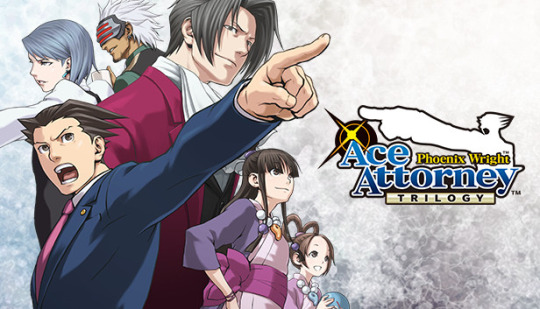
‘Ace Attorney’ is pretty much as far away as you can get from a ‘branching narrative’ within the video game sphere. It is a heavily-linear Visual Novel where 70% of the time it won’t even let you talk to random characters at anything but the exact order it expects you to and any ‘Bad Endings’ are basically just glorified Game Over Screens. (... because this is the Internet and something something piss on the poor, I should probably specify that I am talking about ‘Ace Attorney’ because I love Ace Attorney and these are neutral descriptions of the game and not complaints. There’s nothing wrong with a game being linear.)
If there’s any Dialogue Choice in AA, it’s generally a very basic ‘right answer-wrong answer’ choice between Progress and a Penalty, or a total non-choice that just gets you to the same final result regardless. Except… Well… as we just talked about, getting to the same final result doesn’t necessarily mean a choice is ‘meaningless’, does it?
There’s actually a lot of great storytelling moments where Ace Attorney, despite its otherwise strict linearity, uses this exact sort of recontextualizing mindset I’ve talked about with Undertale to make choices with some really powerful emotional impact…. Even if technically, the ending is the same ending. It can be something as basic as ‘even if picking this Wrong Answer doesn’t get me a penalty, it still embarrassed my character and disappointed my friends/rivals and thus I feel bad for picking it’. Consequences as recontextualizing your character as more incompetent than they should’ve come across at that moment.
And then there’s moments like the iconic ending of ‘Justice for All’. That moment before Franziska bursts into the Courtroom with the case-making evidence and saves the day. The moment where it seems like Phoenix really is gonna have to pick between protecting his best friend and carrying out a rightful sentence.

The player gets to pick between the two options, but Phoenix never gets to say his choice out loud before Franziska comes running in... and yet… he, and the player, still made that choice. Even if no one ever has to experience the consequences of your choice, even if the rest of the world has no idea what Phoenix Wright would’ve chosen if the Miracle hadn’t happened, we know what we picked and that knowledge of the choice matters. Because of how we feel about this choice and what it says about our interpretation of Phoenix… and about us.
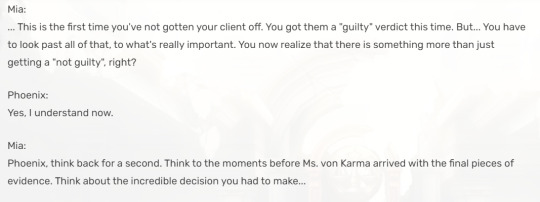

There’s also a bit of this ludonarrative device in ‘The Great Ace Attorney: Adventures’. During “The Adventures of the Runaway Room”, when you investigate the Omnibus for the second time and start finding things that… don’t quite fit together. When you’re finally starting to make progress with proving McGilded’s innocence, while also maybe starting to notice that something is… wrong with these pieces of evidence.

The unchanging linear narrative of the game is that Ryunosuke does eventually realizes McGilded's trickery, puts truth ahead of victory in court and yet, despite his effort and good intentions - the case still ends with a false Not Guilty verdict. And yet, the Player has the choice to... tweak the details.
There are several points where Ryunosuke can object, where he can call out the inconsistencies even though they help his case, where he can support Van Zieks in his accusations of tempered evidence... or he can not. Not necessarily intentionally misleading the Court as much as subconsciously trying to ignore the inconsistencies in the name of trusting his client.

And yet… in the end it doesn’t matter. Maybe Susato calls out the inconsistency instead of him, maybe Van Zieks does, maybe it remains uncontested but... no matter what you do, the case will end with a Not Guilty verdict (I mean, I guess you can deliberately fail the game but that will not progress the plot), McGilded doesn’t seem like he held a grudge (in the few minutes he had left to live), and a few cases later - Ryunosuke would always be punished for his part at this false verdict.
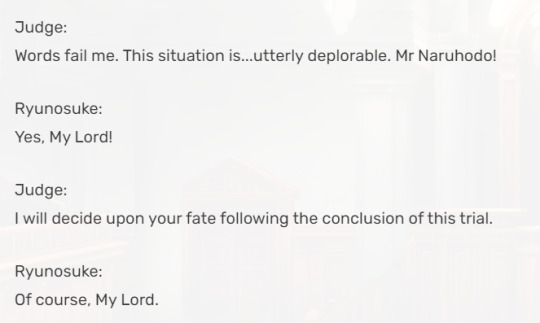
So it doesn’t really matter what Ryunosuke did back then? Does it matter if he did his best and called out every single inconsistencies or if he kinda half-assed it until he (and the Player) had to? He’s still going to suffer the same consequences down the line. And yet….
And yet, I think there’s something so powerful about giving us that option. About knowing that Ryunosuke, and we, did try and do something about McGilded's dirty tricks- even if it didn’t work. Or alternative, knowing that there was more that Ryunosuke and us could’ve done even if it was not nearly enough. Even if in the eyes of the game and the British Justice system there is no difference, the fact that we know what did and what we could’ve done can radically change the way the player feels about all of the later scenes concerning the truth about McGilded’s trial. It can radically change the way the player interpret Ryunosuke’s feelings about it as well.
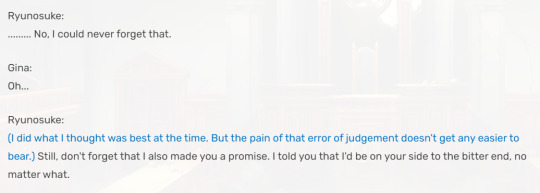
Because even though the game itself keeps playing along with the same script regardless, that trial had irrevocable consequences for the Player.
#undertale#ace attorney#ut#utdr#undertale analysis#undertale meta#ace attorney meta#the great ace attorney#under tale#tgaa#tgaac#dai gyakuten saiban#tgaa1#gaac#great ace attorney#aa2#justice for all#aa jfa#ace attorney jfa#farewell my turnabout#ace attorney justice for all#aa justice for all#phoenix wright#ace attorney trilogy#aa trilogy#phoenix wright trilogy#pwaa#phoenix wright ace attorney#gyakuten saiban
428 notes
·
View notes
Text
The Heaviside Layer
Or, Cats and the Narrative Parallels of Steve and Cesare
After watching UP and re-listening to the Bigtop Burger soundtrack several times, I'm finally able to put into words while Steve and Cesare are obviously different in terms of personality, presentation, etc., when you consider their stories... they're more similar than you may initially realize.
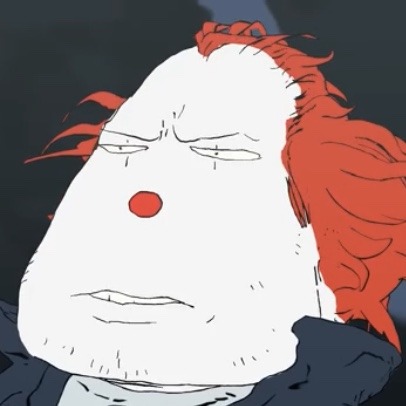

(Watching the 1998 recording of Cats was also very important here. This will come back later.)
So first of all, what's the first thing that these two have in common, ownership of food trucks aside?
To put it the way Cesare does, they're freaks. They're weird. The only way they are able to fit in with others is by being the head of said themed food trucks, and making the uniforms their employees wear match them.
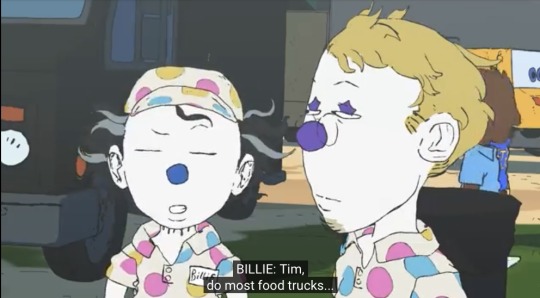
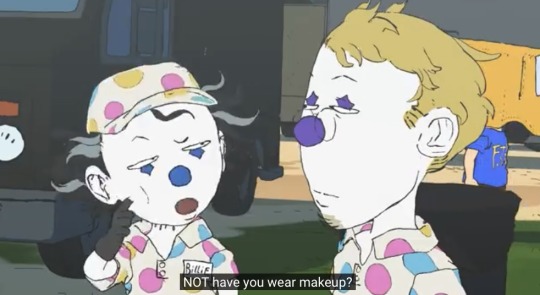
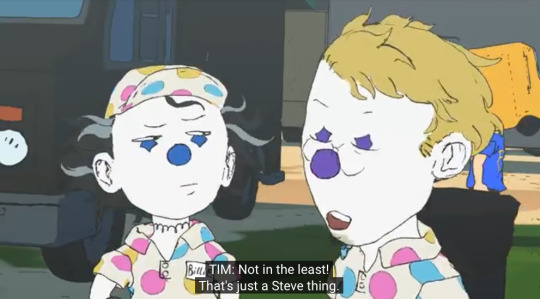
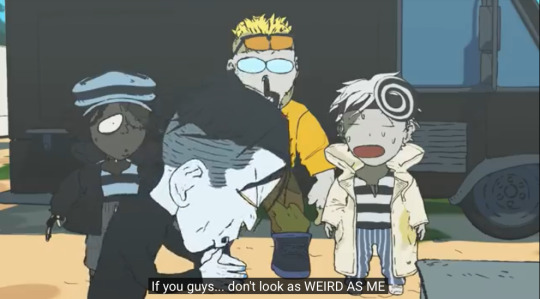
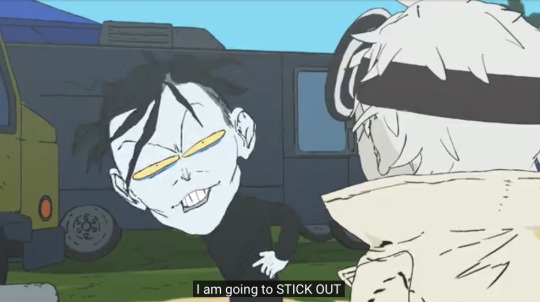
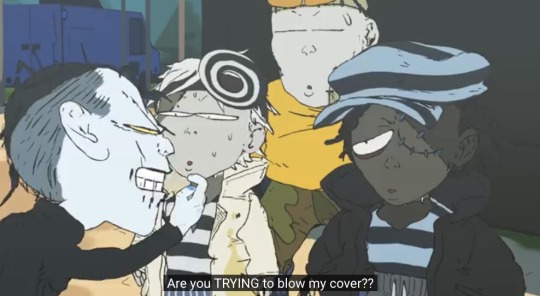
In other words, they are outsiders.
Even before the narrative begins, Steve and Cesare were shown to be cast aside by others. In "UP", Steve is banished from his home planet because he made a mistake at a crucial time, and the lyrics to Friends In Low Places reveal Cesare "wasn't missed or mourned" after he was killed.
They're both dead to the worlds they once knew.
But then...
"up, up, up, to the heaviside layer" - UP
"I was chosen for a second chance at life" - Friends in Low Places
For those of you unfamiliar with the musical Cats, the Heaviside Layer is the place a single Jellicle cat is chosen to go to at the Jellicle Ball each year to be reborn into a new life. Old Deuteronomy, the role Steve played, is the cat that chooses the one who will go to the Heaviside layer. However, Steve, along with Cesare, is more similar to the cat Old Deut ultimately picks.
I'm talking, of course, about Grizabella.
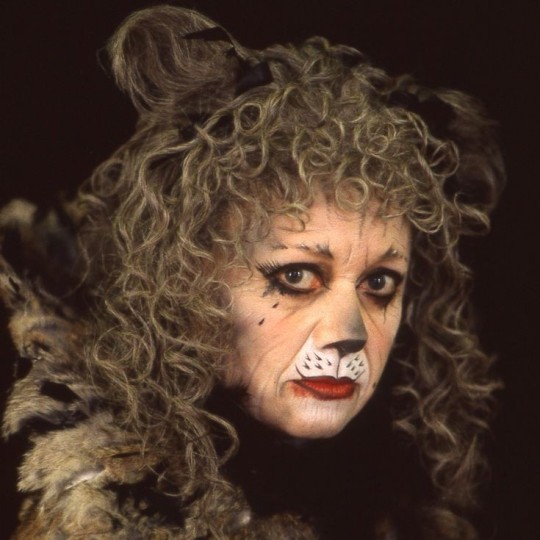
Grizabella is a former Jellicle cat who tries to rejoin the group, only to be rejected. Act II's opening number, "The Moments of Happiness", is sung by Old Deuteronomy (and was fumbled by poor Steve). It foreshadows Grizabella's last desperate cry for another chance in her big number, "Memory". The other cats accept her, and she is chosen to go to the Heaviside Layer and begin again.
So how does this relate to Steve and Cesare?
Both allude to having a new life, but are followed by their pasts. While Steve is happy with his food truck and his new friends, he is pursued by unknown authorities telling him he doesn't belong and can't belong. Along with being cast out from society millions of years ago, he's now been rejected from doing what he loves twice.
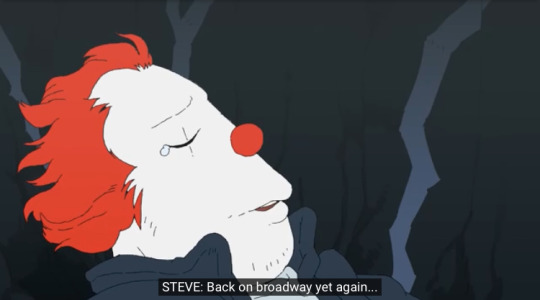
Cesare is almost the inverse. He talks up how he's got new friends (in low places), but he doesn't seem eager to stick around underground, and is vocally relieved that he won't have to be a watcher anymore. Despite being clearly very strange himself, his job is to imprison "freaks and weirdos"- and it might not be a stretch to say he's taken that to heart. Where Steve has no problem standing out, even going out to eat with his employees when they're out of makeup, Cesare insists his own employees make him look less conspicuous whenever he's with them. (Of course, this could be partially because he didn't want Steve to catch on to his plans, but I doubt Steve would have cared, since he had no idea Cesare even wanted to capture him.)
So how can this be resolved? Is there a way to truly begin again?
"Let your memory lead you/Open up, enter in
If you find there the meaning of what happiness is/Then a new life will begin" - The Moments of Happiness
This part in "The Moments of Happiness" is sung not by Old Deut, but a cat in the ensemble named Jemima (and then sung again by the rest of the cats). The lyrics and melody are reprised in Grizabella's song, "Memory". She then adds some more.
"Memory, all alone in the moonlight
I can smile at the old days/I was beautiful then
I remember a time I knew what happiness was/Let the memory live again...
...Touch me, it's so easy to leave me
All alone with the memory/Of my days in the sun
If you touch me you'll understand what happiness is/Look, a new day has begun" - Memory
"Touch me" has both a literal and figurative meaning here. Throughout the musical, the Jellicle cats are noticeably physically affectionate with one another. They play with other cats while dancing, snuggle, and even greet each other by pressing their hands together. This makes it all the more jarring when the Jellicle cats refuse to touch Grizabella at the beginning- even the curious younger cats are held back from getting too close. It is a visual sign that they do not accept her. After Grizabella sings her song, one of the younger cats reaches out to her and touches her hand. None of the other cats make any attempt to stop her. Then, the Jellicle cats finally show Grizabella the affection they denied her before, letting her finally belong, and of course she becomes the Jellicle choice.
I think, just like Grizabella, what Steve and Cesare need is acceptance and a place to belong. This doesn't mean the whole world needs to say they're okay with clowns, or zombies, or general weird freaks who don't fit in. It doesn't even mean they have to give up the memories of how they got here, be they happy or sad. What they need is to be loved for who they are, and to live without being afraid to do so.
And I think the friends they have are a good place to start.
468 notes
·
View notes
Note
Out of curiosity: do you believe Anakin was truly was the Chosen One or was it Luke the whole time?
Anakin. 1000% Anakin. I believe it's Anakin as per Word of God, as well, but I don't have the quote on hand right now.
Part of the weirdness over this is because of how the films were released, Luke is obviously the main character of the original trilogy of films, he's the one on the hero's journey, and there was never any mention of a prophecy in those films. So when the Prequels came out and made this whole prophecy thing for Anakin, it's understandable that people sort-of looked at it and went, "But if Anakin was the Chosen One, why is Luke the hero in the end still?" Which has obviously led to a bunch of theories that it was Luke all along, that Qui-Gon misunderstood the prophecy or just misapplied it to Anakin, or even that Luke BECAME the new Chosen One when Anakin fell (all of which are made worse by Rebels sort-of validating this take by having Obi-Wan claim Luke is the Chosen One). I get it.
But the entire purpose of Anakin's story to me only works if he IS the Chosen One and he just... fails. Anakin fails. He defies his own destiny and it destroys an entire galaxy. One of the BEST things about the Prequels is how hard they work to subvert certain tropes and narrative expectations. Padme and Anakin are forbidden lovers, but it's a toxic unhealthy love and the relationship is forbidden for good reason. Anakin is willing to burn down the world for Padme, but it's not at all romantic when the world is actually burning and it's going to burn both of them down with it. Prophecies exist, Chosen Ones exist, but prophecies can be DEFIED and Chosen Ones can fail if they're making selfish choices. You only get the happy ending from the prophecy if you're making the right choices.
So Anakin DOES end up destroying the Sith and bringing balance to the Force, but only when he makes a choice that's primarily SELFLESS in nature. He MIGHT'VE been able to destroy Palpatine the Sith way, but then he himself would still be a Sith and so the prophecy isn't actually fulfilled. There would be no balance in the Force while Anakin remains a Sith. So until he figures out how to leave his darkness behind, he'll continue to defy his own fate.
And that is a FASCINATING way to represent a prophecy and apply a destiny to someone without completely removing their agency or making all of their choices unimportant. Anakin's choices literally define the fate of the GALAXY because the prophecy only gets to come true when he makes the right choices. Theoretically, Anakin could defy this prophecy until he dies. Personally, I think that this is something that could happen. Anakin could make that choice, he could literally just defy the prophecy FOREVER and it would just never happen. It doesn't mean he ISN'T the Chosen One, he just chose incorrectly and so the prophecy never actually gets to come true.
I also like that this leaves room for other people to achieve the same end without being part of the prophecy. Theoretically, Palpatine could still be killed in other ways, even while Anakin's alive. The prophecy isn't stopping someone ELSE from killing Palpatine (or Anakin), it's just a LOT harder. We do see people more attuned to the Force kind-of stepping back from something they can feel is perhaps someone else's destiny or following someone specifically because they have a destiny for something, but the opportunity is there for regular people to step up where a Chosen One has failed. And it's one of the things I love MOST about the Star Wars universe, I love the way this worldbuilding works.
Luke is still a hero, obviously, he plays a major role in Anakin ultimately making that final selfless choice, his faith in Anakin and his refusal to kill Anakin and his adherence to Jedi compassion are what eventually help lead Anakin towards making the choice that allows the prophecy to finally be fulfilled. I'm not downplaying Luke's importance or his heroism at all, but I think it kind-of makes all of his choices even MORE heroic if he's NOT a Chosen One. He doesn't do these things because he was destined to do them, but because he's a good, kind, brave, strong person making the choice to do heroic things. He's choosing to do what he believes needs to be done for the greater good. He's just a regular person, with no prophecies to fulfill, having to step into the shoes of a hero because his father failed and threw the galaxy into chaos. How is that NOT more interesting than just saying Luke was the real Chosen One all along?
So you'll never catch me saying the Chosen One was anybody but Anakin in canon. It's absolutely Anakin and it'll always BE Anakin. You remove SO MUCH of the best parts of Star Wars if you take away that part of it.
132 notes
·
View notes
Text
Hey so S2E9 'Three Stroires' was fucking bonkers
LETS TALK ABOUT IT
The episode is DENSE AS ALL HELL with things to talk about, the three main things being
The titles
The art style and style of storytelling
The dialogue (or lack thereof)
Lets speedrun some analysis notes of our three favourite members of the worst found family ever!!
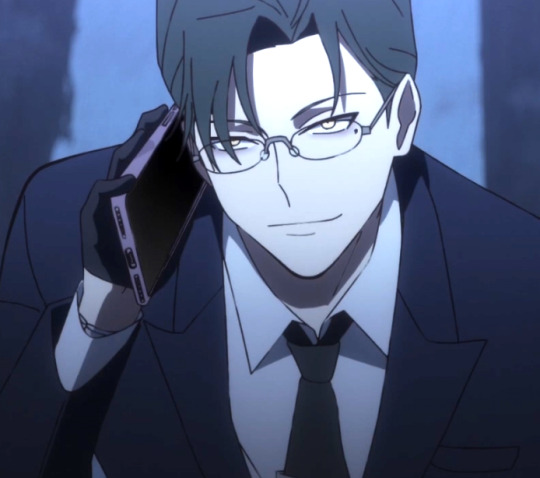

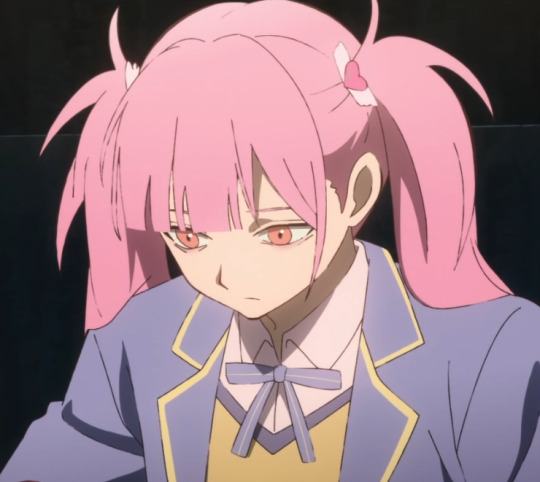





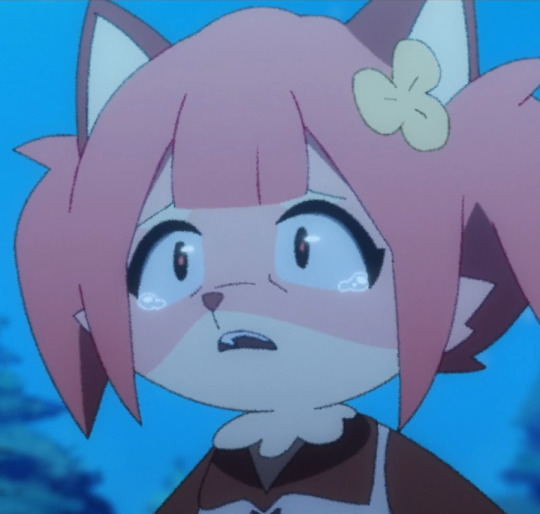
Storytelling Styles
All three stories are emotionally driven and told in dramatic styles without realism, though all for differing reasons.
QJ mimics the over-the-top Shakespearean reminiscent of his wife, believing himself to be the main character of a tragedy. Though this style of story telling is obviously campy and corny, it's also presented in a way where it's not immediately clear to the viewers that this isn't actually real -- it's a fabrication of the canon within the canon as a reflection of QJ's delusions.
LTC mimics QJ, however, his disposition leads to him seeing everything as a Greek Comedy as opposed to perma-victim QJ's Greek Tragedy. It also reflects LTC ultimately leaning into and revelling in killing other people as part of his hunter ethos and evolution. LTC's style does not need to be realistic because LTC isn't looking for meaning in his story, but for an experience that's enjoyable and satisfying.
QJ and LTC's style complement each other with both being able to come together to tell a more cohesive narrative overall, although each does so by focusing on themselves more than anyone else.
LTX is a silent cartoon telling of her life story, quite literally the story that's gone untold, bar the words of the gossiping crows (people with frivolous and passing interest in her life writing their own stories about the events she goes through). Her story telling style is a reflection of her mindset and being trapped cognitively as a child for all time, and is further indication that her personhood wasn't allowed to independently grow since becoming an orphan.
LTX's story is outside of QJ and LTC's narrative because she cannot speak, and thus her story does not matter. No dramatisation of reality to paint a certain picture is needed, nor is her story seen or understood in either of theirs. Her story is insular and disconnected from theirs because her personhood is disconnected from theirs.
LTX's story is told through the lens of LTC and LX's worldview: that the world is made up of beasts and hunters. There is only ever one human character (likely LX himself rather than QJ, based on how visually loyal everyone else's designs are) while LTX watches LTC straddle the line between animal (his nature) and human (his will).
Story Titles
QJ's part being called the "Inevitable Tragedy" is a reference to how he is the creator of his own misfortune as it was never based in reality but his own unchecked paranoia.
LTC's part is called the Fortuitous Comedy is because it was fortuitous for QJ to find out about the twins' powers before anyone else via Tianchen's confession and subsequent laughter. It could also be due to LTC reaching his perceived hunter-status by the fortuitous case of Deng being Liu Min's first requested kill (for the same reason LTC hates Deng, no less).
LTX's title being the "Sibling's Fairy Tale" is rather self explanatory, much like the character herself if you took the damn time to talk to her. It's childish, stuck in the past (trauma), focused on her brother and the other light of her life: their late-mother. Another piece of insight that I remembered hearing is that fairy tales don't always have happy endings, but they always have a moral to learn from. In this sense, Xixi's story is thematically the most important because no character has put that moral into practice (confronting the worst aspects of those you love, refusing to look away from the secrets they hide while you stay in a peaceful dream with their softness).
Additional Notes
QJ caring for the twins in Part II is a reflection of LTC being gaslit about reality (reinforced by QJ's fatherly love being absent in LTX's story), as well as a reflection of his sense of self and human autonomy only beginning and flourishing due to the circumstances QJ provided
LTX's story suggests that most of the time she spends with LTC involves her napping in some form, or that most of her time in general was slept away as if she was trapped in some strange dream.
The only betrayal even hinted at is LTC's betrayal of LTX's morality, a twist that literally shatters LTX's childlike world and forces her hurdling into reality. This is the only betrayal because the twins are the only two who have trust in one another among the three.
Someone else made a point about how even when the foxboy picks up the bow and arrow, he remains a fox. In LTX's eyes, her brother can act as a hunter but he's still a beast and that's not a bad thing.
The fact that most people are 'beasts' and there's only one human in all of LTX's worldview really is some solid symbolism and messaging, especially considering LTX is socially classified as an undesirable a la her disabilities. It's peak reclamation and pride in Oneself.
#link click#link click season 2#link click spoilers#link click analysis#shiguang dailiren#qian jin#li tianchen#li tianxi#li tian twins#LAN went hard with this one#they cooked
45 notes
·
View notes
Text
Thinking about that post that said Will had to be 'written out' of some of the S3 narrative because so much of it was about performing heteronormative relationships…& as an emotionally intelligent gay kid he quite literally stands entirely outside of both of those things.
Like. The Duffers said the premise of S3 was puberty, but in truth it's more like kids trying to act more mature than they are, not only by pretending they’re not into “childish” things but also emulating the relationships of the adults around them (for good & bad).
In S3, Lucas is literally just parroting his dad (and whoever else) when it comes to explaining relationships to Mike, and Max is projecting her displeasure/fear of divorce (because of her own parents) by repeatedly breaking up with Lucas and encouraging El to do the same while quoting Cosmo to her. El has her own streak of performative influence from her time watching all those soaps while locked up for a year—and Mike is just doing the best he can to keep up, seeing as (as we see with the Karen considering but then never actually cheating with Billy plot) Wheelers are often motivated by responsibility and duty to their relationships more than actual feelings or depth with their partners.
From the very first episode though…Will literally says “I’m not gonna fall in love," and while I know a lot of people like to talk about how that's kind of a sign he’s already falling in love with Mike, it’s also showing us that he stands apart from all the other people and “couples” we see this season…because he’s not performing social rituals trying to emulate the relationships of the adults around him.
Will is the only character outside of Dustin (who also comments on this tendency to be fake in love to Steve, ironically enough) who is refusing to take part in the ritualistic gambits of "dating" with his friends, on top of embracing his desire to continue doing the things he enjoys even as we are learning he is genuinely in love with Mike.
Will is the only one being genuine about his interests and desires rather than performing normativity (social and heteronormative) like the rest of his friends--the only one who is in love with his chosen interest because he enjoys being around him, and its that dissonance from the "play"/ sandbox narrative of S3 that makes it seem like The Duffers "forgot" about him (which, given the fact that S5 is confirmed as Will's Coming of Age season, obviously isn't true).
...I just think it's interesting that the season where everyone starts being shallow (because...thats the word for it. We should bring that word back lmao) is the season where it feels like Will gets neglected the most—not because he isn't important to the story, but because Season 3 was when The Duffers introduced dishonesty and ongoing romantic relationships as a concept for their "kid" characters, and Will's heartfelt affection for Mike and unwillingness to lie to anyone stands apart from that.
-
Bonus Thought: If you really want to get into it, you can also pull on how watching Will lie to Mike in Season 4 about the painting hurts all that much more because its the first time he's betrayed his character to "match the energy" of his peers—him "ripping off the bandaid" was him not only choosing to save Mike & El's relationship by sacrificing his own feelings, but also him choosing move into the same kind of dishonesty and shallowness he's been watching everyone around him get away with for two seasons now, even though it was going to break his heart to do so.
S4 got Lucas and Max back to the honesty and closeness they hadn't been mature enough to manage in S3...but that's not something Will got to see for himself. Getting us back to honesty for El, Mike and now Will (who have also been lying to themselves and each other in their performances of normalcy) will be a critical part of the "repair" that happens in Season 5.
#will byers#byler#I have so many thoughts about this fr#like. WILL SEEMS UNIMPORTANT BECAUSE HE'S THE ONLY ONE WHO STAYED HONEST IN A SEASON FULL OF LIES#AND THE GA DON'T SEE IT BECAUSE THEY'RE USED TO SHALLOW NARRATIVES. I SAID WHAT I SAID#duffer brothers#st commentary#my st commentary#stranger things
471 notes
·
View notes
Text
You know it always hurt how the actors who played their respective characters on the show, loved them so dearly but Maisie couldn't ever seem to get that footing when it came to Arya. Emilia loved Dany and Nikolaj loved Jaime. Sophie was obviously on cloud 9 regarding Sansa...but Maisie...every time she spoke about Arya, it seemed like she had nothing in on the character except for those popular misconceptions. I know that this is on the actor themselves but Maisie was so, so young when GoT aired for the first time. Granted she could have given those books a chance later, so maybe this is on her but as an actor she was given a script and whatever she had been given, she always nailed it. She trusted those scripts and it is not like even if she had read the books, she could have had a say in the ( lack of )creative decision of the directors. My point is that there was no love nurtured for Arya in the show. With the plotline where Arya spent so much time on the road, it was necessary for them to dress the actor in rags, but still love could have been nurtured with how one chose to tell the story. I know show only viewers of any series often criticize book purists by saying that not everything on page can be translated for TV and it is true, but that's why we have a team of people working on a show so that even when it becomes necessary to leave out certain things, the essence of story is preserved. Or to even bring the story that has already been told in a book onto new heights ( like I have heard them doing with Jacob's vampire show)...but with GoT and especially when it came to Arya, they cut her down to a deformed skeleton of what the character was actually supposed to be. I don't know if I am remembering correctly but Maisie didn't like those ragged costumes. She was in school and Arya's costumes when on run didn't help Maisie's self esteem, and I understand that the get up with the hair and all was a very important part of the story but Arya had other dresses even when on the run! You are telling me Ed Sheereen ( is that how you spell the name) could be an extra on the set but could not get anyone to play Lady Smallwood? You had Sophie in her #girlboss dress at Vale but not one dress for Maisie with acorns? That's Arya's song. Arya's song with Gendry whom Arya fucked in the show. Stupid ass needle costume for Sophie but not even a rich mummer's cloak for Maisie? You butchered her story, you won't give her more than the bare minimum when it came to costumes. You won't style her...how would she know how to love Arya Stark? I also don't know about her friendship with Sophie. Like that's their business but why blindly agree with everything Sophie has had to say about your character? Like I know there was no research done on Maisie's part...that always sucks. But if the narrative set up by the writers too is that distorted and with a friend whose whole personality during filming was of a Stansa...then yeah it is no wonder why she couldn't really love Arya.
83 notes
·
View notes
Note
my heart aches for one Theodore Nott after reading the latest update 😭 GTC, could you tell us more about your thoughts on him, his characterizations, how you manage to write him so poetically and beautifully, and (a shot in the dark, but i'll bite) the role he'll play in books 5, 6 and 7? congrats on another chapter GTC, i love you tons 🩷
Thank you so much, friend. I love talking about Theodore Nott. I'll gladly bite on that question.
To start off, Theodore's middle name might as well be "THE FOIL," because everything about him is tailor-made specifically to Say Things About Draco Malfoy. He practically hands Draco a card saying "I AM YOUR JUNGIAN SHADOW SELF, PLEASE HANDLE WITH CARE" upon introduction. They meet when they're both fresh off the train. (Hermione beats Theo to Draco by a matter of hours; there's a ton of ways this story spins differently if minor details about the first chapters were changed, and that's definitely one of them.) Then Theo and Draco ride in on the boats together. (Admittedly, I was not aiming for subtlety points with this intro. They are literally "in the same boat.") Immediately, Theo is throwing out narrative parallels like he's getting paid for it: they both have a dead parent. Both parents died under weird circumstances. Their fathers were both Death Eaters. Both of them are the sole heirs and only sons of great wizarding houses. Then they go into the Great Hall together, standing in line, but — and @piedrafundamental left a really banger analysis of the Sorting Hat scene in the comments on that chapter, but I'm going to crib just one line — crucially, "M comes before N." Draco's sorted before Theodore is, and he goes into Gryffindor. Immediately after that, Theodore's shunted into Slytherin, and their paths diverge. Call this the prologue of their relationship. They're not actually gonna get to know each other until Book 2 and Book 3, but this is the part where the narrative is basically jumping up and down and waving its arms at you, going "HEY! THIS GUY! IMPORTANT TO THE STORY! GET WORRIED ABOUT WHAT HE'S DOING, OKAY?"
Then we meet him again in Book 2, and just like Draco, a year at Hogwarts has changed him. He's a little more confident, a little more cocky, a little more comfortable, and — hey, look! He's got a weirdly intense friendship with a girl around his age, too! (Surprise, surprise, Draco is with Hermione when he meets Theo again, and who makes her debut in that moment but Pansy Parkinson?) And there's Daphne, the third leg of the Slytherin Trio, the kind of girl Draco probably would end up with in Slytherin — pretty, sociable, cunning, knows his family history (literally cites it to him in their first introduction, like c'mon), is the sister of his canonical wife, etc. etc., we got layers to this shit like lasagna but this post ain't about Daphne so we gotta move on — point being, either way he flips, Draco's going to be the fourth of a quartet. Which is the entree into the Slytherin politics storyline of Book 2, a.k.a. "the temptation of Draco Malfoy," where Theo is — I mean, to be honest, for once he's really not doing anything that sinister; from his perspective, he's kind of just putting his fucking back out trying to make a friend? He's drawing Draco in a regression towards prejudice and comfort, naturally, but that's not how he sees it. But there's a counterpoint between what Theo's offering and what waits for him in Gryffindor.
So that's the starting block of his character. The rest of the work is building a real person out of that; obviously, you can't just go "this is Foil Man, does whatever a Foil Can" and expect people to be interested. Part of what makes Theo interesting, to me, is that the traits he shares with Draco include a lot of what we tend to like about him — he's driven, intelligent, cunning, and brutal in the defense of those he loves — it's just that the people he loves, the people he surrounds himself with, are deeply prejudiced people committed to doing profoundly bad things. He's been trained from birth in the art of making bad people happy, and he's gotten good at it. And he's just enough of a coward (again, pot and kettle) that he can't imagine a world where that's not the case.
And it drives him fucking crazy that Draco won't admit that. Because I think Theo thinks if he can get Draco to admit they're similar people, it'll validate the choices he's made — like, yeah, he's fucked up horribly, but anyone would do the same, if they had to face what he has. Even Saint Draco. And of course, Draco is absolutely unwilling to go there with him, because:
(a) he very much does not want to believe that his years of grueling internal growth and struggle for betterment are just the product of some good luck with a hat; i.e., a suggestion that is not just insulting but terrifying because it suggests how very close he could be to regression at any time; but also:
(b) it is a fundamental tenet of Theo and Draco's dynamic that Draco does not like Theo as much as Theo likes him. Because where Theo sees his mirror in the light, Draco sees his mirror in the dark. And it's an increasingly ugly picture.
50 notes
·
View notes
Text
Historical Travel in Winter
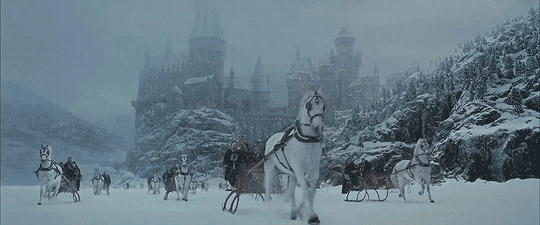
You know, because sick as I am right now watching so much stuff (because I cannot do a whole lot else right now). that I have come across one thing that really irks me right now. I have seen and read too many stories that do not quite get what winter meant in a historical setting for people travelling.
Let me first make one thing clear, because people seem to forget: We do have climate change happening right now. Winters were a lot harsher than they are right now a hundred years ago. Like a lot harsher. While of course not the entire winter was harsh - there would have been times when there was less snow and even rain during the witer months - there was generally a lot more snow fall than there is right now.
The next thing you need to understand is that obviously in historical times (and with that I do not mean until somewhere in the early 20th century for the most parts) the roads were not made with concrete, but were just basically dirt roads. And while some of the most important roads might in fact have someone on a horse drawn snowplow this was not true for all road.
Which means... Well, when there was a lot of snow there was a good chance that you would be fucked, because you could not use the roads. Which meant that for the most part there was not a lot of travel happening during the winter months outside what really needed to happen.
Folks, who were travelling by culture or occupation usually would find a place to winter. So they would find a place (often within a village or town) where they were welcome and spend the winter there. Because if they continued travelling they run the risk of being snowed in somewhere on the road and then freeze to death.
I am talking about this right now because I have now come across so much media where people in a historical setting just travelling during the winter and none of those issues ever coming up. And I find it... kinda a waste. Because it just kinda keeps up a narrative that somewhat acts as if our super mild winters are in any way normal.
You know, I grew up with older European media in which this was still a topic that came up. Which is kinda what annoys me so much in modern stuff, that ignore this.
But also, always remember those horror stories of travel parties getting snowed in an converting to cannibalism over it xD
72 notes
·
View notes
Text
Authority and the Urge: Morality and Redemption in Baldur's Gate 3
Theme 1: Domination vs. Freedom as an Alternative Moral Axis to Evil vs. Good
One thing that makes Baldur's Gate such a pleasure to play is that the writing team had such a clear understanding of their themes. Good and evil are not the clean-cut alignments of the D&D world. Rather, they reimagined good vs. evil along more subtle lines of domination and control vs. personal freedom and healing. For the most part, they are remarkably consistent without being preachy, which is no mean feat. Nor do they say you can't dabble in the morally ambiguous, indeed, all the Companions have dabbled in the morally gray and you are invited to draw your own line as to what behavior you find acceptable for them. Even Wyll and Karlach, the most morally upstanding, have made deals with devils for the greater good, and been press-ganged against their will into fighting for an evil tyrant. You are given the choice to say there is no redemption for even these unwilling moments of moral impurity, if you so choose. You can reject Gale for not telling you about the Orb immediately. You can kill Astarion for being a vampire, which isn't his fault. You can criticize and reject Shadowheart for her Shar worship and thus never learn the full extent of how much it was not her choice to join in the first place. You can also urge companions like Gale, Astarion, and Shadowheart to give in to their worst instincts and become true monsters, which brings me to the next important theme.
Theme 2: What is the Worth of a Single Life?
When speaking of themes in BG3, another major one is the power of one person to sway the path of others in their lives towards good or evil. One hand extended in friendship can draw Astarion back from a painful and self-destructive existence, the pursuit of power to insulate him from pain and harm that ultimately would lead him to perpetuate the cycle of abuse he suffered under. There are clear implications of how much the Companions life is changed by their encounter with the player character, in a really touching dynamic about the importance of one life to another, which also works as a game mechanic, imbuing your interactions as a player character with the satisfying power fantasy of being able to have social impact on your Companions as friends, loved ones, or (in an evil run) victims of your sadism. You can make or break them.
Which brings me, finally, to the Dark Urge. It's clear to my eyes that the Dark Urge was originally planned as The Custom Character path. What I imagine happened next, however, is that they realized that there were hard story beats in the Dark Urge's narrative, certain deaths for example, which would be supremely limiting and unsatisfying for many players, who would chafe against the lack of choice.
The Dark Urge is a fantastic novel character, since characters in a novel don't have to do what the reader would do, but video games with their interactive nature usually require a bit more freedom of choice for players to be satisfying. Obviously there are exceptions to this rule, but in general it's very challenging and rarely attempted in video games to put the player-controlled character into a situation where the player loses agency, where the character dies without player freedom to prevent it, makes choices contrary to what the player character would do in a game that otherwise offers choice, or that simply kills the player character without the option to avoid that fate. It can be done but it's very very tough, some of the biggest complaints leveled at RPGs like BG3 or Dragon Age games is when the narrative takes choice away or makes the character make choices, unavoidably, that players would not make or would fight to avoid if they could. They are often the center of the greatest fandom ire. So that's why I think the OC Tav with the blank backstory was created, for those who chafed at the lovely but restrictive narrative arc of the Dark Urge.
Mirrors of Morality: The Dark Urge's Redemption
I mention that I think the Dark Urge is fundamental to the core design of the game because their narrative path so nicely mirrors the other Companions. A blank-slate Tav is wonderful to work with, and very freeing, but you are left with the slightly hollow feeling of not having nearly the level of trauma or issues to work through that the Companions do. Your character has no past and few opportunities to form a coherent narrative that precedes the events of the tadpoling the way the others do. From a gameplay perspective this is of course nearly impossible to do otherwise, they can't anticipate every RP headcanon a player might run, but they can offer one with the Dark Urge who has the same sort of deep dichotomy and divide in their backstory that the others have.
That said, I completed an Evil Dark Urge run before I completed a good one, despite rolling two attempts at a good Dark Urge before stumbling onto an Evil Dark Urge that worked for me (an older drow matriarch, for those curious).
The reason I struggled was because I couldn't imagine a Good Dark Urge with agency in their prior life. My evil Dark Urge was a willing partner of Gortash and Thorm. One reason I made her older was because I imagined her as mature, worldly, cruel, sadistic, and completely on board with the plot. The amnesia was only a brief interruption to her plans, a distraction. Once she recalled enough of her life and previous goals to piece together her part in the Dead Three plot, she went right back into enacting it and, in the end, won, becoming the unquestioning ruler of a world of thralls in Bhaal's name. If anything, the dialogue options that implied that Bhaal was the one controlling her, or that she had done anything but make her own choices were almost insulting. This woman knew what she was doing, beginning to end, with the amnesia as only a minor interruption.
But this interpretation of the Dark Urge was based on the letter we find in the Dark Urge's point of view, where again, they show no unwillingness to be an agent of the Dead Three plot. Gortash's warm welcome further cemented the view in my mind: the Dark Urge knew what they were doing and was a willing evil participant.
So how, I wondered, can anyone justify a Good Dark Urge? Not saying it can't be done, but how?
The implications I found troubling at first were that anyone who was evil would become good if they were simply removed from their environment. It had a ring of a sort of natural innocence, a sort of "noble savage" worldview that all of us would tilt towards good if our minds were wiped clean. Optimistic in some ways, very dangerous in its implications in others. Then I realized it wasn't a statement. It was a question.
Theme 3: Nature vs. Nurture
I then realized that nature vs. nurture is actually everywhere in BG3 side plots. Another reinforcement of the fact the Dark Urge storyline is baked into the DNA of the story. You have the Githyanki egg plot, Baelen's memory loss making him a good but absentminded person (which can be undone if you give him noblestalk, when he reverts back to the cruel man he was), heck, even the owlbear cub can be given a loving home where he thrives. You are shown, over and over again, stories where you can choose and contribute to and ponder whether or not evil is a product of nature or nurture, in a way that's incredibly relevant to pondering the Dark Urge's path forward under amnesia. Was this Bhaalspawn evil by nature or by choice? It's very juicy stuff.
Furthermore: all of the companions actually offer ways to rationalize the Dark Urge and choose a path forward for them to fall back into evil or move forward into good. This is because the writers of BG3 are actually superb at thematic mirroring. Each Companion can be a mirror for one way to understand the Dark Urge, how they were evil in the past, and how they could choose to change.
Shadowheart: Indoctrinated into the cult of a cruel god from childhood, you grew up in a world where the only moral compass you had was utterly controlled by those around you. You never knew a different world than the cult of Shar/Bhaal. Now with your memory wiped, you have the option to listen to the voice deep down that says the cruelty demanded of you by the little you can remember feels wrong or even follow the good examples of your newfound Companions to see a different way to live. Maybe you always had goodness in you deep down, but the society you knew channeled you towards evil that you're only now free of, albeit with a past full of holes you're trying to fill in again.
Karlach: Maybe you were never a truly willing participant in the Bhaal cult. Incredibly skilled at killing, yes. Perhaps a bit morally flexible to get involved with figures like Gortash. But ultimately, when you were whisked out of the bloody war and world that you were immersed in by circumstance, you saw your chance to get your old life back from before the Bhaal cult and you took it. Baldur's Gate is your home. People like Karlach are the ones hurt by the actions of the Dead Three Plot that you might never have put a face to if you'd never been taken from that world. Now that you see the harm caused, now that you're free, you can finaly become your own person again after being a foot soldier for evil forces.
Lae'zel: You were a true believer in Bhaal's cult. You grew up worshipping your evil god. It's the only life you knew and the only life that gave you meaning. You were a willing participant but before now, you'd never known any other life. However, through exposure to other people, other cultures, other ways of life, you're beginning to see that there are ways to live outside your narrow life of indoctrination in violence. The final blow comes to this worldview when you learn that your beloved god is completely fine with your destruction. They allowed Orin to take your place. Bhaal/Vlaakith would see you destroy and enslave the world for their own glory and be perfectly happy to destroy you at the end of all your hard, devoted work. You did not sin against Bhaal by rebelling against the full horror of his cruelty and negligence towards you, rather, Bhaal has sinned against you.
Gale: You were the beloved Chosen of Bhaal. Coddled, cradled, told you were special and perfect and wonderful. Of course you happily participated in the Dead Three plot, you lived a charmed life as the elevated darling of your deity. But then something went wrong. You were cast out. You've awoken lesser than you were, your body betrays you, you've lost knowledge that once made you walk among mortals as a near-godly figure. And it seems like Bhaal/Mystra doesn't care, as you wander the wilderness. You're hurt. Betrayed. Tadpoled. Orin has taken your place so easily, just as Gale was cast aside so easily. You don't know what you did wrong. You're angry. Resentful. How dare Mystra/Bhaal cast you aside so easily? They offer you a solution to get back into their good graces which require a complete denial, a complete destruction of yourself - becoming Bhaal's chosen once more or blowing yourself up for redemption. Ultimately, the way forward is in choosing yourself and relying on your own cleverness, rather than being seduced back into their circle of influence.
Astarion: Bhaal was a cruel master to you who controlled your every move. That doesn't mean you were a nice person though, or you didn't enjoy murder. But now you are finally free of Bhaal/Cazador's immediate reach. They cannot fulfill their evil plot without you. You can destroy them now, undermine them, or replace them - fulfill the Dead Three plot in your own name. Or you can take this chance once finally outside their grasp to rediscover who you really are, what you want, all the while your hungers drive you towards continuing to take the lives of others. But perhaps the help of new friends can help you deny these urges and steer you towards being a new person. What that new, better person is, what they even look like, is unclear to you, you've never really had positive influences. But maybe you can find it together.
Wyll: You lived your own life before you ended up in Bhaal's plot, as Bhaal's chosen. But that life was stolen. Now, through circumstances beyond your control, you have disappointed your father. Is there a way to escape the reach of Bhaal's control, Bhaal's pact? Will you sacrifice your soul to redeem yourself in the eyes of your father?
Honorable Mention - Minthara: Tadpoled and controlled by the Absolute, you are now set on throwing down all old gods that once thought to control you. Maybe you'll take over the Dead Three plot in your own name. Maybe you'll just take pleasure in tearing it down for your own reasons. Either way, your gods have sinned against you, the cult of the Absolute controlled you, and now you are unleashed to take vengeance.
With the Dark Urge, any one of these paths can provide a map for how to imagine your life under Bhaal's cult. Any one can provide a map for how to make use of your newfound freedom and to justify becoming a better person and saving the world. Or choosing not to.
#bg3#bg3 meta#the dark urge#this got long but oh well i had a lot of thoughts that kinda went together
67 notes
·
View notes
Note
Re: your last reblog, aside from... trauma sometimes very obviously coloring people's view of things (like anon), I think one reason the fandom in general cares more about Crowley's wants and needs is that... We don't see much at all of them being met. Crowley has the Bentley, the plants, and good alcohol. At a stretch he has his fashionable clothes.
Aziraphale feels guilty for wanting the things he wants, but he still has them: the bookshop is his cozy little nest where Crowley's flat is 100% aesthetic (and yes I know it's a refuge for Crowley but it's not his home, is what I mean, in the sense that he doesn't live there); he has his books, his records, his favorite mug and his favorite tea, his shops, his restaurants where they know him by name, and so on and so forth. And he has Crowley willing to do literally anything for him bar going back to Heaven.
Of course Crowley's lack of things, of comforts, of basically anything, isn't Aziraphale's fault (to me, he's very obviously punishing himself, and he does whatever Aziraphale wants because he wants to make him happy, not because Aziraphale is making him) but I think that seeing Aziraphale having those things and Crowley having basically nothing, and then adding that point that Crowley will do anything for Aziraphale, it's kind of easy to fall into the false equivalence that Aziraphale should be providing whatever Crowley doesn't have. And don't get me wrong, it'd be nice to see Aziraphale doing more tangible stuff for Crowley because it has become kind of unbalanced (because of them BOTH, let me be clear: Crowley wanted to give Aziraphale whatever he wanted and Aziraphale didn't think too much about it becoming the status quo), but also, aside from stuff like that original temptation to Gluttony that got him started on eating, Aziraphale found those hobbies and those creature comforts by himself, he actively sought them out (case in point: the oysters) and that's what Crowley needs to do, too. (I don't know if I'm making sense here lol)
Answer under the cut to not clog y'all dashboards rip
You def make good points I find myself agreeing with. On this one thing it's much harder to figure out how Crowley feels about it, because we see a lot more of the way Aziraphale engages with his passions and hobbies than we do Crowley, that's for sure.
We can argue that he likes gardening, and maybe going for long drives? We also know that book!Crowley likes watching television and has a collection of CDs so we can garner he also likes music-- but all the same we don't see him engage with these interests of his in the same way that Aziraphale clearly revels in reading and listening to records and eating.
It's easy to sort of assume that Crowley's whole existence is pretty much centered around Aziraphale and his company, because we never truly get to see him act particularly relaxed unless he's eating with Aziraphale or drinking with Aziraphale or just be around Aziraphale in general.
Personally I don't think that Crowley doesn't have other things that fill his life with joy other than Aziraphale, mostly because if that was truly the case idk how the poor demon wouldn't have lost it out of sheer boredom during the long stretches of time he spent away from Aziraphale. Is just that by both the narrative beats of the story and Crowley's sort of 'grumpy devil-may-care' attitude it is nowhere near as blatantly obvious that he enjoys being on earth and partake in all the things offered by humanity as it is for Aziraphale.
So yes, I agree this is probably one of the -many- reason why what feels like a large part of the fandom has the tendency of imagining Crowley entirely hopeless and distraught without Aziraphale, and thus to feel like Aziraphale isn't dedicating enough attention to him, or is willingly hurting him by being selfish and callous.
I don't think I've made a secret of how much I disagree with this idea, by this point. They are both extremely important for one another, obviously, and show it in all the big and small ways they've been allowed to by the precarious position they are in as technically enemies on opposite sides. But they are both also their own person with their own ideas and opinions and needs and wants that, sometimes, might not necessarily align; they are both pretty independent and capable of existing more or less satisfyingly even if they aren't in each other's pockets all the time-- So yes, I understand why a lot of people in the fandom think that Crowley is more or less a utterly lost mess that would crumble down without Aziraphale, but I don't, and I lowkey resent this interpretation of him lol.
The one thing I-- sort of disagree?? I guess, in your message, is the fact that their dynamic is unbalanced. For one Crowley is actually plenty capable of saying 'no' to Aziraphale; I'm def also guilty of feeding into this idea because it is, admittedly, really quite amusing to poke a bit of fun at Crowley's expense and call him a simp and say that Aziraphale has him wrapped around his little finger-- It is easy to sort of fall into the trap of thinking that Crowley can be commanded by Aziraphale like an errand boy, and forget that's really not the case.
Which also goes hand in hand with the second reason I don't entirely agree with the idea their dynamic is unbalanced, because I think Crowley takes great satisfaction in doing nice things for Aziraphale. So in that sense things are kept equal in the way that Aziraphale feels happy and satisfied and implicitly knows that Crowley cares for him whenever he's being catered to, and Crowley is equally satisfied by being able to kind of play the part of the attentive partner and see his angel all smiley and happy and be comforted by knowing that Aziraphale isn't afraid of being open with him about the things he wants because he trusts him.
To be clear I also a 100% want to see this happen in reverse. I want a comfortable, utterly relaxed Crowley to do his own version of puppy eyes at Aziraphale to get him to do something nice for him, and I want Aziraphale to happily, gladly do so.
I just don't think that as things between them stood up until the very end of S2 Crowley would have let himself show vulnerability, because they simply aren't quite yet in that comfortable spot in which they can say "yes, we love one another and we are together and we'll keep being together for the rest of all time without having to worry about anybody playing interference or threatening our very existence".
I don't think Crowley will manage to be so vulnerable as to openly display his desires until they reach that safety--- And at the same time I can't and won't blame Aziraphale for it. It's not Aziraphale's fault that Crowley has been forced in a spot in which he is pretty much constantly on guard and won't allow himself to fully relax, just as it isn't Crowley's fault Aziraphale hasn't been able to fully free himself of Heaven's clutch and shake off those unhealthy coping mechanisms he has. They are both stuck in a shitty position trying to make the best of it they can.
I do think part of Crowley's character arc in S3 might be him learning to lower his guard somewhat and be more emotionally open, to reach a point in which he can be as openly happy to be on Earth and enjoy it as Aziraphale is, and am definitely looking forward to it as much as I'm looking forward to Aziraphale finally actualizing his own thoughts and morals independent from whatever Heaven or even God says and fully free himself of those fears and doubts once and for all.
#good omens#why every post I start to write about Them(tm) turns into a mini essay#free me from the brainrot lmao
29 notes
·
View notes
Text
Where's Daryl?
This was very difficult to write. It opened up a lot of old wounds for me, so if you read this, thank you. If my thoughts on this show haven’t been your cup of tea, that’ll most definitely be the case here as well, so maybe just move along. ***Trigger warning for discussion of childhood abuse***
For about a year and a half, Caryl fans asked Where's Carol? as a pointed reminder that the spinoff was always meant to be hers just as much as it was Daryl’s. Even though she's back now, her fans didn't always know she would be (nor did the EP's 🙄) so her absence during filming and promotion of the first season was a heavy burden to bear. The irony is, though “Daryl Dixon” sticks out like a sore thumb in that ridiculous font, he's the one who feels absent sometimes, as if important parts of his character development were lost when he washed ashore while other parts come and go as the plot demands.
Zabel talks about swapping Daryl's iconic vest for "old man" suspenders as a matter of pragmaticism i.e. they were the only clean clothes available. Norman says it was a choice he wanted for some unclear reason, but neither of them seem to consider the intelligence of their audience, particularly Carylers, to see it more symbolically. The costume change is our visual reminder that Daryl isn't himself. In some scenes he's chattier than he should be, far more trusting of strangers with personal details, and far more theatrical. Then in others, the differences are even more alarming. He calls a child cruel names, puts his hands on him, and feels conflicted about returning home to his family, to the woman he said he loved.
I mentally prepared myself for retcons, but the one I'm struggling with a lot right now, which I haven't seen anyone bring up yet, is the retcon of Daryl’s childhood abuse. Daryl tells Isabelle that he and Merle had to take apart engines and if they couldn't put them back together, their dad wouldn't let them have dinner. It's a milder version of the stories the scars on his back tell us, though I can buy Daryl omitting the worst of it like he did in the pilot. What I can't buy is Daryl saying his dad was "hardly ever" around and emphasizing it as the main source of his pain growing up. It feels contradictory for one thing. When we see Daryl's scars for the first time in S3 of the flagship show, it's implied Daryl was trapped in an environment that enabled his dad to physically hurt him often. Presumably that's why Merle felt guilty about leaving him behind. The revelation also seems like it's only intended to highlight the consequences of an absent father figure, explaining Daryl's fear of not making it home, but also justifying his "close" bond with Laurent. The best stories allow a character's emotions to drive the plot, but this just does the opposite, twisting Daryl's backstory to fit the current narrative.
Daryl's backstory made so many people root for him in the first place. It allowed Carol to see him when nobody else in the group could. It helped me process my own childhood trauma. The ways I got to watch him overcome his violent past gave me hope that masculinity could mean more than what I grew up around—more than anger, shouting, and swinging fists. Daryl taught me that men could still be tender, kind, and loving even if those closest to them in their childhood never showed them how. I imagine Daryl's representation has been important to boys and men too, specifically to those who were afraid to speak up about their abuse because of the stigma around it. The implications of this scene may not be easily noticeable to some, but they are to me, and I'm deeply offended by it.
I’ve talked at length on this blog about how it takes a village to make or break a show, though it’s usually the showrunner who has to answer for it. I've already mentioned that I do blame Zabel. His knowledge of French history has no value when he obviously didn’t bother to study Daryl’s history aside from reading old scripts and (maybe) watching the first couple seasons. That's incredibly irresponsible and terrifying for S2. I also blame AMC for their short-sightedness and their determination to save face no matter how much it costs them. I blame Gimple for his pettiness. I blame Greg Nicotero for his insensitivity to Melissa and her fans.
As for Norman, he's hinted very loudly that he wants credit for the show being "different," so in theory he should be prepared to take some of the blame too. I can't name all of the decisions he specifically made, but no matter what they were, I can blame him for not speaking up about the shipbaiting, Daryl's wavering loyalty, and the childhood abuse retcon, all things that hurt his character and hurt the fans. I genuinely don't know what else to think other than Norman didn't give either the consideration they deserve. The show has been treated like nothing more than a vanity project, and it’s unfortunate when you think about what he and AMC had to gain from the original Caryl spinoff.
I love the version of Daryl I knew before this whole mess, I love Carol, and I love the relationship between them. I want them to have the story they deserve in S2. At the moment, I don’t know how to reconcile that with the agony I feel over the damages to half of my two favorite characters. If Carol is going to cross the Atlantic ocean to find Daryl, I want him to be the man who threatened to punch holes in all the boats so she couldn’t leave and the man who told her he loved her before—ironically—leaving himself. I need to hear Daryl admit he hasn't been completely honest with the French characters, not because he was afraid of getting too close to them, but because he didn't want to face the pain of potentially living without Carol and TF. I need to hear him say that he can't be Laurent's father, which is okay because the kid has plenty of other family to take care of him. I need to hear him say, out loud, that he could never love another woman romantically because he's already in love with Carol. That's what I need to feel better about this story. That's where my investment is. I feel like Carol is safe in Melissa's hands, but I don't feel like I have anyone to rely on for Daryl. That’s a big problem because their stories are so intertwined. There’s no Daryl without Carol nor Carol without Daryl. If you ruin one of them, you risk ruining both of them, and that’s a possibility I really can’t bear.
49 notes
·
View notes
Text
I’m going to rant about this because I need someone to rant about this too.
The Fnaf movie did Cassidy so dirty.
First of all, they decided to turn her into a boy for seemingly no reason other then it’s easier to understand who possesses who, but I think it would still be clear to have a girl possessing a male animatronic, audiences are gonna get that. It also helps prove that Fnaf really cannot write female characters, Charlie was fucked over in the book series, Vanessa’s entire character revolves around breaking free from Glitchtrap which is a plot point we were somehow still on in Help Wanted 2, and Cassidy is criminally underutilised. Elizabeth and Baby are the only solid written characters, and even then Baby is fucked over by the books. They do have some okay characters, like Cassie, Abby and Movie Vanessa but even then, they’re either under-utilised and we don’t know much about them, or their stories aren’t finished yet so it’s hard to comment on them.
Second of all, adding onto the point of characters being under-utilised, where was Cassidy for the whole film? She is the one of the most important spirits of the entire franchise and in the film, he is the one to communicate with Mike but he’s never part of the group. Same with Fritz honestly, those two are excluded for seemingly no reason but Cassidy wasn’t even there for William’s death. Sure, he stood in the doorway in the movie but in the games, she was directly responsible for springlocking him and they couldn’t even let her have that, they gave it to the cupcake.
And third of all, why the fuck did she try to kill Abby? I get that the movie had the whole plot point of the spirits not knowing William had killed them but even then, Cassidy is an incredibly vengeful spirit. She knows what’s it like to have her life ripped away from her so carelessly and cruelly and she’s yet a-fucking-okay with trying to springlock Abby. Just comparing movie Cassidy to game Cassidy shows just how awful movie Cassidy’s character writing is.
Cassidy shows up, he talks with Mike and says he’s going to kill his sister, shows up at Abby’s house, kills her aunt, lures her to the restaurant, attempts to springlock her which is just an agonising death, isn’t there for killing William and just stares at him.
Now if we compare this to the Cassidy in the games, she was most likely killed via springlock failure caused by William, yet still tried to help his family. She actively spoke with the Crying Child and Michael, showing she’s not just blinded by revenge, she was a genuinely kind person. Her being the one to springlock William makes so much sense narratively because it was the same way he killed her, and makes the moment so much more impactful. From then, she helps to put the Crying Child to rest and presumably the rest of the Missing Children, in some theories about the lore, she even communicated with Henry and helped him. And of course, she is the one who sets up UCN to torture her killer, making him live through every mistake of his life. But this doesn’t allow her to rest, or anyone else and we can interpret that she let him go due to the story, ‘The Man in Room 1280,’ where William’s corpse explodes, implying he was set free and the cutscene where Cassidy faded into the dark. AND EVEN THEN, the Princess from Princess Quest is called ‘Cassidy’ in the files, showing that she is still here and trying to help Vanessa because she is a good person.
Movie Cassidy is none of these things and only served to make Cassidy even more unknown as a character. She is so misused by the games, by the franchise and deserves better because she is my favourite and deserves a proper character after everything she has done.
Also obviously, don’t send hate to the actor of movie Cassidy, he’s like nine
#fnaf#fnaf movie#michael afton#cassidy#fnaf cassidy#cassidy fnaf#william afton#Elizabeth afton#the crying child#evan afton#vanessa#vanny#vanessa afton
34 notes
·
View notes
Text

screenshotting for use instead of forcing them to see hella tags but as someone who has a constant background of narration around special interests going on in their head which eventually will start to run out of "canon compliant" possibilities and start experimenting with crossovers: this is why I struggled for a bit to do a coherent plotty crossover between daredevil and nbc's hannibal. this is another rambling "for me and literally two other people with my interests and way too interested in meta-compliancy" post:
basically: daredevil and nbc's hannibal have conflicting main themes in ways where they don't as easily synthesize into a new coherent theme. nbc hannibal basically amounts to: what does it take for a person to become a 'monster,' or otherwise transform into a version of themselves that would be a terrifying stranger to them previously. and it sort of frames it as... not necessarily a power fantasy, but it frames trauma as something powerfully transformative. you become a version of yourself that can survive/thrive/take control in the hell you've ended up in. you will surprise yourself what you are capable of doing when it's your only option. but at the same time, its a sort of "succumbing" to your situation.
daredevil is almost antithetical to this. matt's whole thing can kinda be summed up as "even after everything, it's still you." you can go through any amount of trauma and still be able to recognize yourself after. you can stick to your principles even when pushed to the limit and come out alive, and being able to do so is important. he IS his principles, and even though he constantly falls short of himself, his struggle is a definitive trait of his. whenever he starts to abandon his principles is always tied to him losing his sense of self.
he cannot win (in the long run) if he abandons who he is, even if it's only an internal struggle. it's especially prevalent in the comics where basically whenever he abandons his principles he has a bit of a flip-out and tries to abandon "matt murdock" entirely, and then struggles to maintain whatever new identity he takes and has a whole identity crisis/mental breakdown. his strength is his stubbornness and refusal to remain fallen from his standard of self.
so obviously, one of these themes need to bend so far it breaks when put together. put matt in range of the BAU/Hannibal's house and its the big book vs thin book meme. in part because matt's biggest struggles in his narratives are against structural violence and systems (not to mention... the smells...). "there's this one evil guy causing 90% of the problems" is again basically antithetical to matt's narratives, or are at the most just his weakest plots.
ALSO, a lot of the murders in hannibal get treated as combinations of three categories (by Hannibal, who I would say has the most Thematic Influence over the show): 1) they basically deserved it and they were better off being dead in whatever form than alive (mason, mischa's killer), 2) what the killer gained from their death was more important than their life (sorta the case of melissa, her death being the photo negative so will could understand the ripper), 3) their death was important to the killed person, they were only able to ascend or transcend something in their death (many of the ripper victims and general murder victims.)
Basically "agreeing" with Hannibal, or adopting his viewpoint, (or basically being 'seduced' by the story) requires viewing deaths in those three ways. It requires a sort of dissociation with the reality of a person dying in any practical matter. any death becomes metaphor and symbolic, and the symbol is more important than the ending of life, it transcends it. this also doesn't rock with matt's themes.
even if you go serial killer AU matt's relationship with violence, and the temptation of committing murder, is based around practicality. it's that killing would technically be the most efficient way of stopping someone from hurting other people ever again. it's how he could cut through the red tape and financial security that protects fisk or fisk's stand-in, the way they've manipulated systems of supposed justice to hurt people (and specifically innocents), and just end it for good. obv in cases where that does happen (by his hand or others) it again leans into the fact that there is no single bogeyman that can be killed to stop evil or whatever. if fisk dies, there is a replacement to that power vacuum, if matt steps into that role to try and control it, he fails miserably.
hannibal approaches the seduction of murder with: and it's actually awesome? while daredevil approaches it with: it won't actually help you, and it won't fix anything. you will only destroy yourself. both of the (shows at least) fixations on catholicism also have parallel approaches with hannibal encouraging you to become your own god and daredevil reminding you that you aren't. will is basically betrayed by his friends and community while matt is consistently supported by his.
ultimately, nbc hannibal is very metaphorical and artsy and pretentious (i say lovingly) while daredevil is like. How Would Superpowers Effect The Local Law Economy.
#i almost made this also about why alternia AU for daredevil would be based#but this is way too long already#and i kinda wrote a bit about it in a prev post#but basically it transforms the theme of 'how can systems of justice that tend to fail still be used to help people'#into 'what if your only system of justice was inherently evil'#WHICH IS AWESOME#daredevil#hannibal#posting this without rereading any of it i already spent too much time on this#no read more Read My Post Boy#varcahs speaks
32 notes
·
View notes